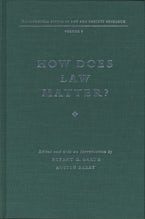LAW / General
Showing results 1-5 of 5
Filter Results OPEN +

Murder and Its Consequences
The essays in Murder and Its Consequences span several periods in the history of capital punishment in America and the professional career of Leigh Bienen, a leading researcher on the death penalty. “A Good Murder” describes the subtle relationship between high-profile murders and the death penalty, while “The Proportionality Review of Capital Cases” places the well-known study of proportionality in New Jersey within a nationwide context.
How Does Law Matter?
Fundamental Issues in Law and Society
These essays show how law is relevant in both an "instrumental" and a "constitutive" sense, as a tool to accomplish particular purposes and as an important force in shaping the everyday worlds in which we live. Essays examine these issues by focusing on legal consciousness, the body, discrimination, and colonialism as well as on more traditional legal concerns such as juries and criminal justice.
Everyday Practices and Trouble Cases
Fundamental Issues in Law and Society
Everyday Practices and Trouble Cases asks how law helps to constitute the worlds in which we live every day, and how law responds to disruptions and disputes that arise in various realms. Leading scholars explore the dichotomy between everyday practices and trouble cases, and the way various kinds of research have addressed that dichotomy, illuminating the pervasive role of law in social life as well as the capacity of law to respond to social conflict.
Federalism
David Shapiro explores the virtues and defects of federalism as it has developed in this country from a variety of perspectives that include historical, constitutional, economic, social, and political considerations. Using the dialectical form adopted by advocates trying a case before a court, Shapiro not only examines the strongest arguments on the two principal sides of the issue but also probes the potential value of the dialectical process itself.
Chicago Lawyers, Revised Edition
The legal profession is stratified primarily by the character of the clients served, not by the type of legal service rendered, as John P. Heinz and Edward O. Laumann convincingly demonstrate. In their classic study of the Chicago bar, the authors draw on interviews with nearly 800 lawyers to show that the profession is divided into two distinct hemispheres–corporate and individual–and that this dichotomy is reflected in the distribution of prestige among lawyers.

Murder and Its Consequences
The essays in Murder and Its Consequences span several periods in the history of capital punishment in America and the professional career of Leigh Bienen, a leading researcher on the death penalty. “A Good Murder” describes the subtle relationship between high-profile murders and the death penalty, while “The Proportionality Review of Capital Cases” places the well-known study of proportionality in New Jersey within a nationwide context.
How Does Law Matter?
Fundamental Issues in Law and Society
These essays show how law is relevant in both an "instrumental" and a "constitutive" sense, as a tool to accomplish particular purposes and as an important force in shaping the everyday worlds in which we live. Essays examine these issues by focusing on legal consciousness, the body, discrimination, and colonialism as well as on more traditional legal concerns such as juries and criminal justice.
Everyday Practices and Trouble Cases
Fundamental Issues in Law and Society
Everyday Practices and Trouble Cases asks how law helps to constitute the worlds in which we live every day, and how law responds to disruptions and disputes that arise in various realms. Leading scholars explore the dichotomy between everyday practices and trouble cases, and the way various kinds of research have addressed that dichotomy, illuminating the pervasive role of law in social life as well as the capacity of law to respond to social conflict.
Federalism
David Shapiro explores the virtues and defects of federalism as it has developed in this country from a variety of perspectives that include historical, constitutional, economic, social, and political considerations. Using the dialectical form adopted by advocates trying a case before a court, Shapiro not only examines the strongest arguments on the two principal sides of the issue but also probes the potential value of the dialectical process itself.
Chicago Lawyers, Revised Edition
The legal profession is stratified primarily by the character of the clients served, not by the type of legal service rendered, as John P. Heinz and Edward O. Laumann convincingly demonstrate. In their classic study of the Chicago bar, the authors draw on interviews with nearly 800 lawyers to show that the profession is divided into two distinct hemispheres–corporate and individual–and that this dichotomy is reflected in the distribution of prestige among lawyers.





